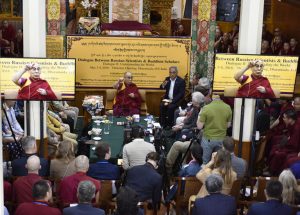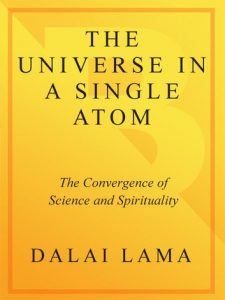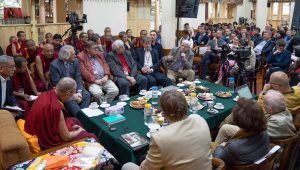
Photo: dalailama.com
His Holiness the Dalai Lama participated in a round table discussion with nine Russian scientists at the conference Understanding the World: The second dialogue between Russian scientists and Buddhist scholars which took place in the main Temple in Dharamshala on May 3-4. The discussion focused on the topics discussed in His Holiness’s book The Universe in a Single Atom: the Convergence of Science and Spirituality. The event was organised by several Russian scientific institutions and Tibet support centres as well as His Holiness’s own foundation, the Dalai Lama Trust.
 In the conference, as in his book, His Holiness examined how quantum mechanics, cosmology, neurobiology and psychology relate to Buddhism and noted how these fields often overlap. While quantum physics is a relatively new field in the West, he asserts that the same concepts were recorded in Buddhist texts 2000 years ago. For example, Buddhists believe that there were multiple “big bangs” – a concept now gaining acceptance in modern science.
In the conference, as in his book, His Holiness examined how quantum mechanics, cosmology, neurobiology and psychology relate to Buddhism and noted how these fields often overlap. While quantum physics is a relatively new field in the West, he asserts that the same concepts were recorded in Buddhist texts 2000 years ago. For example, Buddhists believe that there were multiple “big bangs” – a concept now gaining acceptance in modern science.
While different religions share the common belief that we need to practice kindness, His Holiness contends that this view has failed to be accepted and enacted by the majority of the world’s population. Since the secular perspective of science has a broader appeal, he hopes that itwill be a more effective means of showing people the benefits of kindness and compassion.
“At this very moment, people are being killed elsewhere in places like Syria and Yemen, while others are dying of starvation. And worst of all there are people killing each other in the name of religion. We contradict our compassionate nature out of a short-sighted failure to recognise the oneness of seven billion human beings.”

The Dialogue Between Russian and Buddhist Scholars at Dharamshala
Photo: dalailama.com
Russian neurobiologist Prof Pavel Balaban discussed his research finding that 30-40% of rats, in common with other species, reveal a natural sense of compassion. His |Holiness agreed that many mammals show emotions and proposed that further research could examine whether insects and reptiles are also capable of showing appreciation and compassion.
The two-day conference explored many other subjects at the intersection of science and Buddhism includingneuroplasticity, how to control emotions and the relationship between the brain and consciousness.




 Print
Print Email
Email